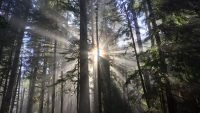That Which Lies Beyond the Sun
Growing up, I had a tendency to view my mom as the sun. Warm and bright, she sustained my life. Her blond hair emulated the brightness she gave the world around her, her kindness and generosity knew no boundaries. And, if I was around her too much, especially as a teenager, I would feel burned out. Tired, argumentative and wishing that I could recharge in the shade for a day away from her.
On the day that she died, I believed that the sun left the Earth. The world looked and felt dark, I didn’t believe that I would be able to feel happiness again. There were days that I could not stop crying. And the days when the tears stopped, I felt guilty, that I should cry for the rest of my life because my mom had died and that I would miss her. The complex emotions relating to grief felt amplified in my 18-year-old brain. She died on May 8, 2017, one month and four days before I graduated from high school. I started navigating the trails of my life blindly, overwhelmed by all I had to do to simply survive. The areas in my life that used to be full of beautiful, blossoming flowers now sat stagnant and wilted. I wondered if I would ever feel happy again.
I left for college in the Fall of 2017, never mentioning to my new friends that my mom had died. I thought that if I could keep it concealed, in a box put away in the corners of my mind, my life could continue on. I would spend my days going to class and socializing and my nights spent isolated and mourning my mom. My life continued this way for years, never learning to process the death of my mom and weighed down by grief that wasn’t improving with time.
I joined Wild Grief’s Young Adult program in the Fall of 2020, at the age of 21. At this point in my life, I felt embarrassed to still be struggling with my mom’s death to the extent that I was. I had difficulty even mentioning that my mom was dead without bursting into tears, regardless of where I was.
I cried during the entirety of my first session, and for the first time, I wasn’t embarrassed. Instead, I was able to look at other people in similar situations and felt support and understanding. I learned about the overwhelming emotions I was experiencing and how to manage them. Losing my mom was not in my control, but learning how I could process her death was. My time with Wild Grief was pivotal in my lifelong mental health journey.
Recently, a friend and I were traveling through Idaho and decided to stop and visit Ernest Hemingway’s grave. Atop the author’s massive grave marker, visitors had left an assortment of coins and empty liquor bottles. These relics lay tribute to Hemingway’s troubled life, the coins symbolizing good luck as his journey on Earth ceased, a loving notion towards a man who took his life. Nearby was another large tombstone belonging to a local family.
Although there was no fame associated with this family name, I found myself drawn to the relics left behind by family members. Atop the stone read “You must not deny the experience of that which lies beyond the sun.” I took a picture of the marker, my socks and sandals just peeking through along the bottom of the photo.
I’m not sure if heaven exists, or if my mom lived a life worthy of gaining entrance. But, I do know that her journey on Earth has ceased and that all matters relating to life for her are continuing beyond the sun. And that, whatever it might be, is enough for me.
Julia Clevinger is an outdoor guide for Wild Grief and can frequently be found spending time with her family in her native city of Portland. Wild Grief provides guided hikes at all levels, hour-long, day-long and multi-day, all focused on supporting each other while on our grief journeys. This story first appeared on the Wild Grief blog.
Solace is now Tulip Cremation, the nation’s largest online direct cremation services provider, delivering world-class and compassionate care 24/7.
Proudly providing:
Denver cremation services
Los Angeles cremation services
Portland cremation services
San Francisco cremation services
Seattle cremation services



